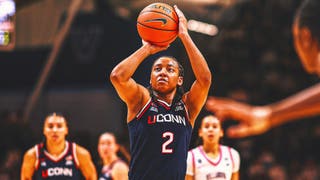OAKLAND, Calif. – Jeremy Tyler was in Israel two years ago when the moment came that made him realize his unprecedented experiment wasn't quite going to work out as planned.
During the Jewish holiday of Yom Kippur, one of the holiest days of the year, he was at home at night watching a movie. The noise was blaring on his speakers, and the lights were on in his house — all a big no-no in a place where life revolves around religion.
Neighbors came knocking on his door, screaming. The commotion created such an uproar that even the police were called. In just one night, the first American-born player to drop out of high school for a professional basketball career overseas had offended what felt like an entire country.
"I didn't know. It was a complete culture shock," Tyler said Monday when he was introduced by the Golden State Warriors after being selected 39th overall in the NBA draft. "It was a big wake-up call."
There have been many of those on Tyler's journey.
A former high school phenom in San Diego, the 6-foot-10 power forward/center was considered perhaps the best big man in his class. But he wasn't happy at his school and wanted to transfer ahead of his senior season, only he couldn't because of district rules.
Along with offers from almost every major college, a few international leagues called. After watching Brandon Jennings opt for Europe instead of college, Tyler and his family decided to take an even bigger risk.
All of 18 years old, he left high school after his junior year and signed a $140,000 deal with Israeli team Maccabi Haifa. Life would never be the same.
"There were two roads to take. I took the harder road," Tyler, now 20, said.
Nothing went as he'd hoped.
Tyler's father, James, spent the first three weeks with him in Israel. Then only a cousin stayed. Tyler was stuck on a team with three big men, and he was raw and unpolished, up against grown men for the first time in his life who could match his muscle. He eventually quit after a disappointing start.
"That's a tough position for a teenager. But he wanted it, so I supported his decision," his mother, Martin, said. "He had to grow up really fast."
While Jennings went on to a stellar young career with the Milwaukee Bucks after only one season abroad, Tyler still had another year before he could meet the NBA's rules of being a year removed from his senior season in high school.
Former shoe company executive Sonny Vaccaro, an adviser to Tyler and his family, told The Associated Press after Tyler left Israel in 2009 that the experience there was "more embarrassing than detrimental" and that Tyler wasn't ready to grow up.
Tyler still had another chance to prove he made the right choice.
On his second go-round, he decided to travel across the Pacific to Japan. Tyler signed a deal with Tokyo Apache, and by all accounts, was starting to grow into the player many thought he could become.
Mother Nature had other plans.
In the middle of an online video chat with his mother in March, everything started to shake — not an uncommon feeling in Japan or for a kid from Southern California used to earthquakes. This one was different.
"He said, 'Mom, it's not stopping! It's not stopping! Everything is shaking!'" she said. "We were very scared. But the one thing we were able to do was Skype with him. Later on, when we saw how big the devastation was around Japan with the tsunamis and everything, I didn't want to tell him. He was in Tokyo, and there was no TV or anything there for him.
"I figured he had been through enough."
With all the chances Tyler has taken, perhaps it's only fitting that the franchise that drafted him would also gamble.
The Warriors paid Charlotte $2 million in a surprising decision to move up in the second round and select Tyler. Golden State needs a big man desperately and believes Tyler can eventually become that missing piece.
There was still some debate about whether to make that kind of financial commitment on an unproven talent whose work ethic and maturity have been questioned. In a crowded room on draft night last week, new Warriors assistant general manager Bob Myers spoke up.
Myers had known Tyler since Tyler was in middle school and kept in touch through his connections from his previous job at the Wasserman Media Group, where he was a sports agent. Myers let his voice be heard one last time by posing a question to new coach Mark Jackson in front of the basketball operations staff.
"I told Mark, 'You've got to coach this guy,'" Myers said. "He said, 'Let's get him.'"
The Warriors will try to be patient with Tyler and aren't expecting major contributions immediately.
They have a stellar backcourt with Stephen Curry, Monta Ellis and first-round pick Klay Thompson. But Golden State has little size up front, a big reason the Warriors have been one of the worst defensive teams for most of the last decade.
Tyler doesn't consider himself a "long-term project," just another rookie who needs time to transition. Jackson views him the same way and said he will give the promising prospect a chance next season.
While he may have lost money on his rookie contract by slipping in the draft, Tyler believes his tumultuous path has made him stronger. Even if it didn't always seem that way.
"There were times I was like, 'Man, this is really hard.' But there was never a time where I regretted my decision," Tyler said. "I'm happy with it. I'm in the NBA. I have a chance. That's all I ever wanted."
___
Antonio Gonzalez can be reached at: http://www.twitter.com/agonzalezAP








































